- Home
- Quizzes
- My Quiz Activity
- Newsletters
- Sports Betting
- MY FAVORITES
- Add Sports/Teams
- SPORTS
-
NFL
- NFL Home
- Arizona Cardinals
- Atlanta Falcons
- Baltimore Ravens
- Buffalo Bills
- Carolina Panthers
- Chicago Bears
- Cincinnati Bengals
- Cleveland Browns
- Dallas Cowboys
- Denver Broncos
- Detroit Lions
- Green Bay Packers
- Houston Texans
- Indianapolis Colts
- Jacksonville Jaguars
- Kansas City Chiefs
- Las Vegas Raiders
- Los Angeles Chargers
- Los Angeles Rams
- Miami Dolphins
- Minnesota Vikings
- New England Patriots
- New Orleans Saints
- New York Jets
- New York Giants
- Philadelphia Eagles
- Pittsburgh Steelers
- San Francisco 49ers
- Seattle Seahawks
- Tampa Bay Buccaneers
- Tennessee Titans
- Washington Commanders
-
MLB
- MLB Home
- Arizona Diamondbacks
- Atlanta Braves
- Baltimore Orioles
- Boston Red Sox
- Chicago White Sox
- Chicago Cubs
- Cincinnati Reds
- Cleveland Guardians
- Colorado Rockies
- Detroit Tigers
- Houston Astros
- Kansas City Royals
- Los Angeles Angels
- Los Angeles Dodgers
- Miami Marlins
- Milwaukee Brewers
- Minnesota Twins
- New York Yankees
- New York Mets
- Oakland Athletics
- Philadelphia Phillies
- Pittsburgh Pirates
- San Diego Padres
- San Francisco Giants
- Seattle Mariners
- St. Louis Cardinals
- Tampa Bay Rays
- Texas Rangers
- Toronto Blue Jays
- Washington Nationals
-
NBA
- NBA Home
- Atlanta Hawks
- Boston Celtics
- Brooklyn Nets
- Charlotte Hornets
- Chicago Bulls
- Cleveland Cavaliers
- Dallas Mavericks
- Denver Nuggets
- Detroit Pistons
- Golden State Warriors
- Houston Rockets
- Indiana Pacers
- Los Angeles Clippers
- Los Angeles Lakers
- Memphis Grizzlies
- Miami Heat
- Milwaukee Bucks
- Minnesota Timberwolves
- New Orleans Pelicans
- New York Knicks
- Oklahoma City Thunder
- Orlando Magic
- Philadelphia 76ers
- Phoenix Suns
- Portland Trail Blazers
- Sacramento Kings
- San Antonio Spurs
- Toronto Raptors
- Utah Jazz
- Washington Wizards
-
NHL
- NHL Home
- Anaheim Ducks
- Arizona Coyotes
- Boston Bruins
- Buffalo Sabres
- Calgary Flames
- Carolina Hurricanes
- Chicago Blackhawks
- Colorado Avalanche
- Columbus Blue Jackets
- Dallas Stars
- Detroit Red Wings
- Edmonton Oilers
- Florida Panthers
- Los Angeles Kings
- Minnesota Wild
- Montreal Canadiens
- Nashville Predators
- New Jersey Devils
- New York Islanders
- New York Rangers
- Ottawa Senators
- Philadelphia Flyers
- Pittsburgh Penguins
- San Jose Sharks
- Seattle Kraken
- St. Louis Blues
- Tampa Bay Lightning
- Toronto Maple Leafs
- Vancouver Canucks
- Vegas Golden Knights
- Washington Capitals
- Winnipeg Jets
- NCAAF
- NCAAM
- Boxing
- Entertainment
- Lifestyle
- Golf
- MMA
- Soccer
- Tennis
- Wrestling
- More Sports
- RESOURCES
- My Account
- YB on Facebook
- YB on Twitter
- YB on Flipboard
- Contact Us
- Privacy Policy
- Terms of Service
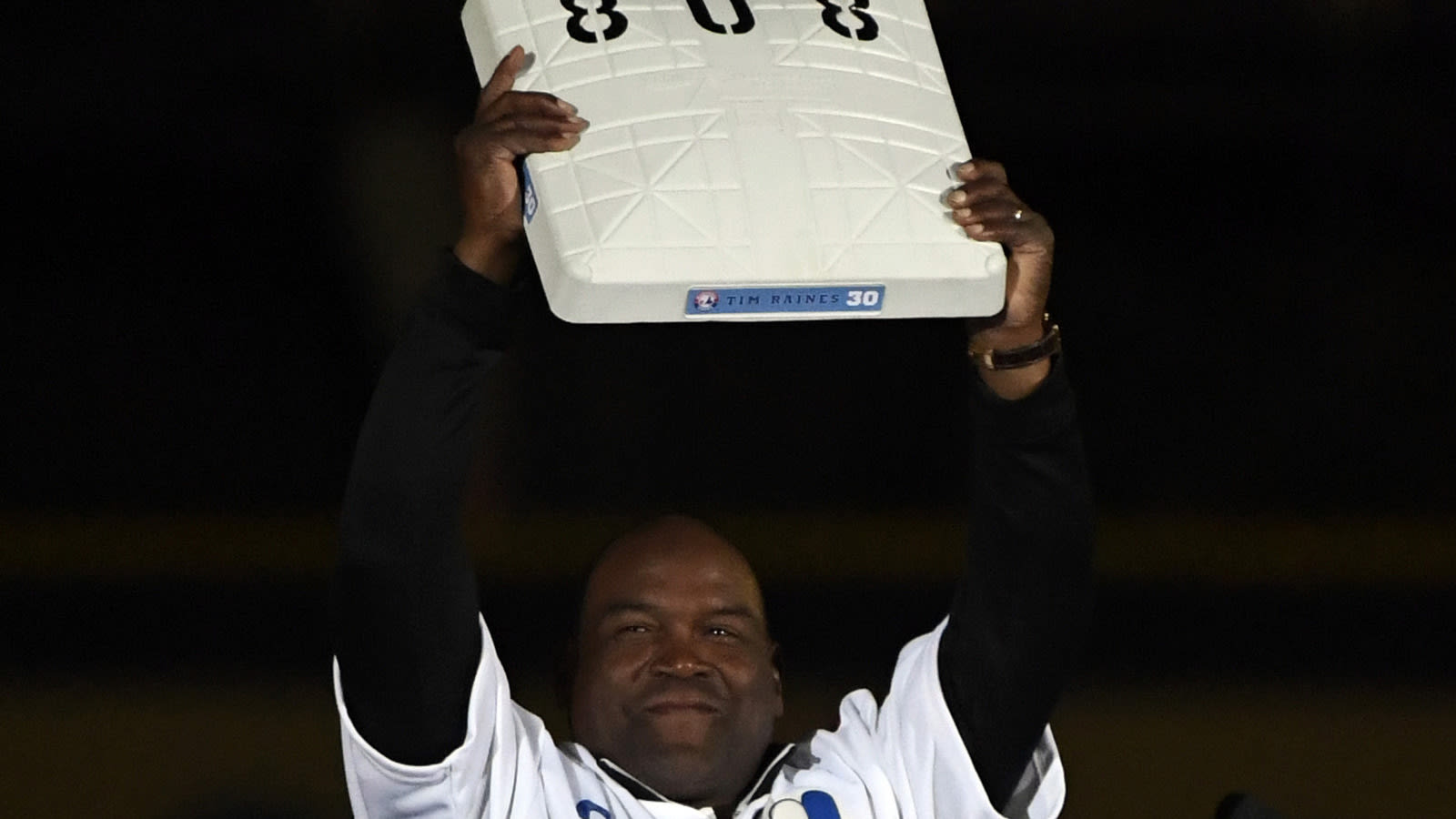
The most memorable moments from the class of 2017 Baseball Hall of Fame inductees
This weekend, baseball royalty will make its annual convergence on Cooperstown, N.Y., to welcome the newest inductees to the game's most exclusive fraternity. As Hall of Fame weekend prepares to celebrate the accomplishments of Jeff Bagwell, Tim Raines, Ivan Rodriguez, John Schuerholz and Bud Selig, it is a prime opportunity to highlight a handful of the reasons why they are headed toward their introduction to immortality.
Here is a look at a few of the career highlights and most memorable moments of the National Baseball Hall of Fame's class of 2017.
Jeff Bagwell
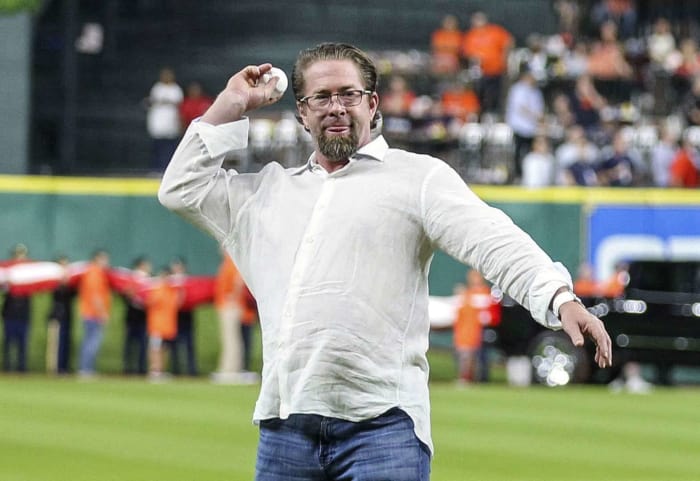
The seventh time was the charm for the hard-hitting former Rookie of the Year and MVP. The only player in MLB history to achieve six consecutive seasons of 30 home runs, 100 RBI, 100 runs scored and 100 walks, Bagwell will be the second Astro in the last three years to be enshrined in Cooperstown.
The best minor league trade ever?
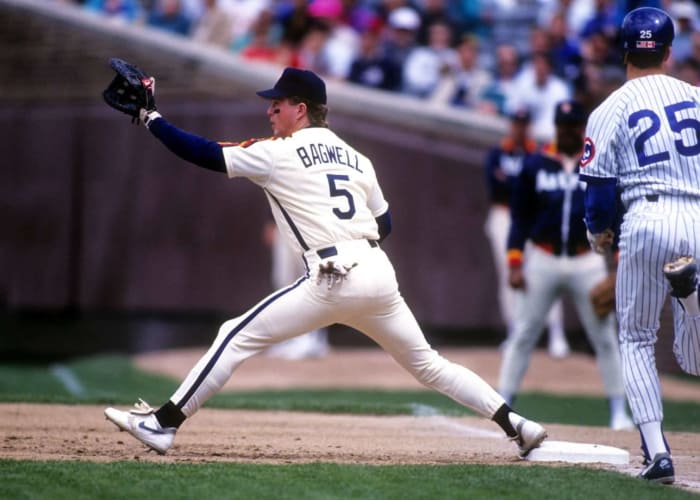
Bagwell spent 15 years and 2,150 games in Houston and never played a game for another organization. However, before he could plant his roots with the team whose cap will adorn his plaque in Cooperstown, he was a part of one of the most lopsided trades in history — as a minor leaguer. The Boston Red Sox traded then Double-A third baseman Bagwell to Houston in August 1990 for pitcher Larry Andersen. Due the presence of Ken Caminiti, Bagwell was moved across the diamond to the position where he would become a four-time All-Star.
Rookie of the Year in '91
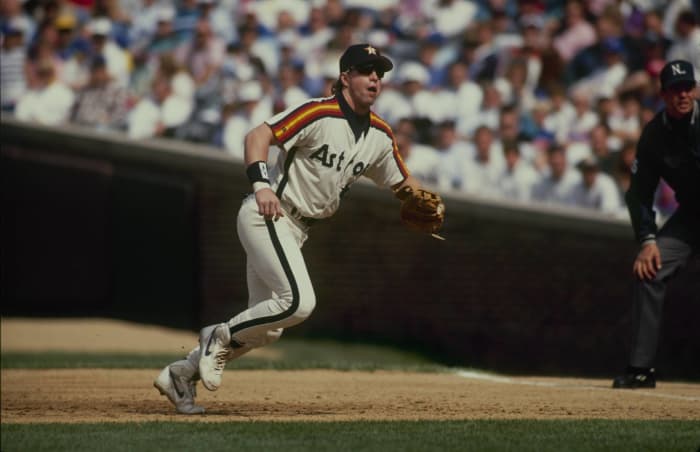
After tearing through competition in his first spring training in Houston, Bagwell forced his way on to the MLB roster and did not miss a beat. Bagwell hit 15 home runs, drove in 82 runs and racked up 26 doubles en route to becoming the first Astro to ever take home Rookie of the Year honors. Not bad for a guy who was making the switch to a position he had never played before and skipped the Triple-A level altogether.
Killer B’s

During his time in Houston, Bagwell led the way for two versions the famed "Killer B’s," initially alongside Derek Bell and Craig Biggio, and later Lance Berkman. During the era of the various incarnations of the group, the Astros finished in first or second place in the NL 11 out of 12 seasons from 1994 to 2005. Bagwell and Biggio played more games together than any other set of teammates enshrined together in the Hall of Fame.
Shortented season MVP

Although the season was shortened by the strike of 1994, Bagwell was unanimously voted National League MVP. Bagwell led the NL in six categories, including runs scored (104), RBI (116) and total bases (300). With his season limited to only 110 games, he set a record fewest plate appearances needed to reach both 100 runs and 100 RBI. The season remains one of the great "what if" scenarios ever, as there was the possibility of Bagwell reaching Hack Wilson’s single-season RBI record if he could have played the 50+ canceled games.
Top of his game

In addition to his 1994 win, Bagwell finished in the top three of NL MVP voting in two other seasons, 1997 and 1999. His ’99 campaign ultimately became the most complete of his career, as Bagwell led the majors in runs scored (143), bases on balls (149) and games played (162). He also clubbed 42 home runs and stole 30 bases, the second time in his career he joined the rare 40/30 club, a level that has only been reached 11 times in history and by no other first baseman.
Tim Raines

Although his opportunity to receive the call came down to the last possible hour, Raines' time has finally come. He'll bring his legacy as the National League's greatest base thief in the last 40 years to Cooperstown and bring all of Montreal with him.
Seven-time All-Star

During the 1980s, Raines reached the Midsummer Classic during the first seven years of his career from 1981 to 1987, all as a member of the Montreal Expos. He was elected as a starter in left field in both 1982 and 1983, and was MVP of the 1987 game, when he hit a game-winning triple in the 10th inning.
Prolific on the basepaths

Raines led the National League in stolen bases in each of his first four seasons and had at least 70 swipes in each of his first six seasons. He is the only player to ever steal 70 bases in six straight years. For his career, his 808 steals are fifth all time. But for Raines, his proficiency on the bases was more than just sheer volume — it was also precision. Raines was successful in 84.7 percent of his career stolen base attempts, the most ever for a player with 300 or more steals.
Batting champ in '86

Raines carried a .294 career batting average over his 23-year career and had over 2,600 hits. He hit over .300 in seven different seasons and carried a .323 average over a four-year span from 1984 through 1987. His top season in that run was 1986, when his .334 average made "Rock" the NL batting champ in a year when he also led the league in on-base percentage (.413).
Two-time champion in the Bronx

After successful stints in both Montreal (whose cap his HOF plaque will feature) and Chicago with the White Sox, Raines joined the New York Yankees in 1996. He won World Series in both 1996 and 1998 with the Yanks, playing a rotational outfielder role during the early days of their return to prominence in the late '90s. He hit .299 over three years in the Bronx.
Already a HOFer
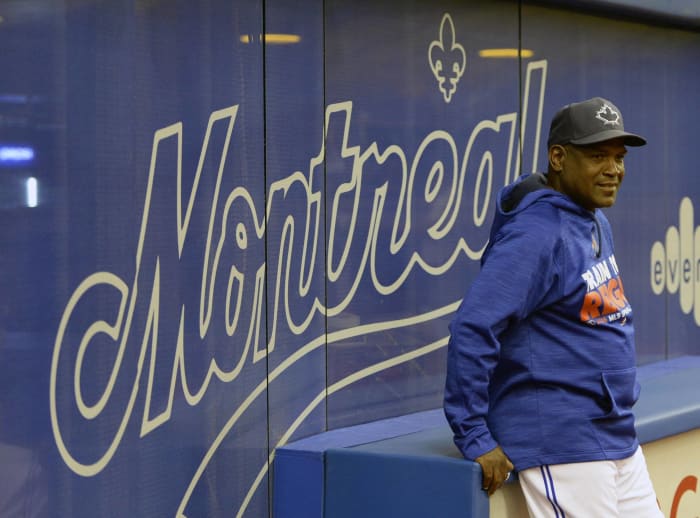
While it took a decade for Raines to finally work his way into the National Baseball Hall of Fame in America, there were far less reservations about his career on Canadian grounds. Raines was elected to the Canadian Baseball Hall of Fame in 2013, as a tribute to his unparalleled career with the Montreal Expos. Raines holds seven career records in Expos history, including most runs scored, times on bases and, unsurprisingly, stolen bases.
Ivan Rodriguez

Blessed with one of the strongest cannons ever unleashed from behind home plate, Pudge will enter Cooperstown as the sole first-ballot candidate in this year's class. The longtime Rangers backstop will be the second catcher inducted in as many years, following 2016 inductee Mike Piazza.
Teenage superstar

After making his debut at age 19 in 1991, "Pudge" became the youngest player in history to catch a game in Major League Baseball history. As a matter of fact, he was the youngest player in the game over his first two seasons. Rodriguez finished fourth in the AL Rookie of the Year voting as a teenager and made his All-Star debut before his 21st birthday.
Perennial All-Star and MVP

Rodriguez was an All-Star in every year of his 20s, making nine straight starts behind the plate for the American League. One of those seasons was 1999, when Rodriguez went on to win Most Valuable Player honors in the American League after becoming the first catcher in history to reach 30 home runs, 100 RBI and 100 runs scored in a single season. He also hit .332, stole 25 bases and put together a 20-game hit streak from May 8 to June 1.
The gold standard

Pudge won the first of his 13 career Gold Glove Awards in 1992, 10 of which came consecutively. His most famous tool was the power and precision of his arm from behind the plate, as Rodriguez threw out 45.6 percent of would-be base stealers during his career. Rodriguez is also the MLB all-time leader in putouts and games played behind the plate with 2,427 at backstop.
Championship pit stop

After spending his first 12 seasons as a Ranger, Rodriguez made a brief but substantial stop in Miami. In his sole season as a Marlin, Rodriguez played a vital role in bringing a second World Series title to the organization and the only one of his career. Pudge was especially potent in the National League Championship Series, where he hit .321 and mixed in a pair of home runs to lead Florida over the Chicago Cubs en route to becoming NLCS MVP.
The complete package

While Rodriguez’s defensive exploits are his calling card and rightfully so, there is perhaps no catcher in the game’s history with as complete of a résumé as Pudge. A .296 career hitter who hit .300 or better in eight consecutive seasons and 10 years overall, Rodriguez produced a 68.4 WAR in his career, the third highest in history by a catcher. He also stands as the career leader in hits (2,844), runs scored (1,354) and doubles (572) by a backstop.
John Schuerholz

The longtime executive with the Atlanta Braves and Kansas City Royals will get his due for a distinguished front office career. Among his many honors, Schuerholtz stands as the first general manager to win the World Series in both the American and National Leagues.
Legacy of excellence

After beginning his career as a scout with the Baltimore Orioles, Schuerholz moved over to join the Kansas City Royals when the franchise was born in 1969. He played a role in drafting and grooming George Brett and Frank White, who would make the Royals into an AL powerhouse by the late 1970s. He became the club’s general manager in 1981 and constructed the club’s first World Series winner in 1985.
Building a 'Brave' new dynasty

After 22 years with the Royals, Schuerholz left for Atlanta in 1990 for what would become his career’s signature role as general manager of the Braves. After losing 97 games in his first year with the team, Atlanta transformed into a 97-win, National League Champion a year after Schuerholz arrived. Built around a trio of Hall of Fame arms, under Schuerholz’s watch Atlanta won 14 division titles in a 15-year time span and reach four World Series.
Reaching the mountaintop

Although being a postseason mainstay for over a decade, the Braves often found themselves as bridesmaids at best by the time the season’s business settled. By 1995, they had reached the World Series three times in five years but had no titles to show for it. But behind a third straight Cy Young season from Greg Maddux and a brilliant eight-inning, one-hit shutout in game 6 from Tom Glavine, the Braves won their elusive World Series title, their first and only as residents of Atlanta.
Partnership with Bobby Cox

For as much success as Schuerholz had in designing the Atlanta roster, it was his partnership with Bobby Cox (whose footsteps he followed in as Braves GM) that was a massively important part of driving the team’s success. Schuerholz brought aboard Maddux, Terry Pendleton and Fred McGriff, and Cox took the incoming talent, developed the likes of Glavine, John Smoltz, Chipper Jones, Ron Gant and David Justice, and they made magic together. Schuerholz will now join Cox in Cooperstown.
The trade that almost was

At the height of the Braves' rise, Schuerholz nearly pulled off the coup of all coups to get the club over the hump. In the spring of 1992, he almost completed a deal that would have brought Barry Bonds over from Pittsburgh and extend his expiring contract in the process, all for the minor cost of reliever Alejandro Pena and outfielder Keith Mitchell. While the trade ultimately fell through and the team instead had to "settle" for using that capital to acquire Maddux, who went on to win Cy Young honors in each of his first three years in Atlanta, it shows just how shrewd and savvy Schuerholz was in putting together the Atlanta dynasty.
Bud Selig

Only Kenesaw Mountain Landis served as commissioner of baseball longer than Selig did. It can be easily argued that no man who ever sat in the seat moved the game forward in more ways than Selig did.
Hometown savior

Long before he reigned over Major League Baseball from the commissioner’s office, he stood as a savior for baseball in his hometown of Milwaukee. After watching the Braves leave town for Atlanta in 1965, Selig worked over the next five years to ensure the city remained a viable location for a return, working to schedule neutral-site games at Milwaukee County Stadium. The local games were successful, and ultimately so were Selig’s plans to return an MLB franchise to the city, as he purchased the Seattle Pilots in 1970 and rechristened them the Milwaukee Brewers.
Crafting a legacy as commissioner

After over 20 years of serving as owner in Milwaukee, Selig set his sights on higher grounds. In 1992, he became acting commissioner of Major League Baseball, a role he held for six years before taking on the role officially. Over his 23 years sitting at the head of the MLB table, he oversaw sweeping changes to the game. During Selig’s run, interleague play, league realignment and Wild Card play were all instituted. Expansion franchises in Arizona and Tampa Bay were born, while the Expos left Canada and relocated to Washington, D.C. Instant replay began and vastly expanded, the World Baseball Classic started, and retirement of Jackie Robinson’s No. 42 and annual day in his honor at every MLB ballpark were made official.
This one counts… a bit too much

Perhaps the most curious call of Selig’s tenure was his decision to reward the winning league of the All-Star Game with home-field advantage in the World Series starting in 2003. It was a conclusion Selig made after the 2002 ASG ended in a tie, much to the chagrin of many followers and participants in the game. This is one piece of his legacy that has run its course, as starting with this summer’s All-Star contest, the winning league will not be awarded home-field advantage any longer.
Weathering the waters of the strike

MLB Advanced Media

For a sport that is often criticized as being antiquated and operating out of time, no league took further strides in setting the curve of technological advances in the game than MLB Advanced Media. Launched in 2000 as a way to consolidate ticket sales and the online presence of each MLB member franchise, the company now generates over $600 million per year. In addition to operating the wildly successful MLB At Bat app and websites for minor league Bbseball and the YES Network, MLB Advanced Media also provides infrastructure for the WWE Network, HBO Go and WatchESPN sites, among others.
Matt Whitener is St. Louis-based writer, radio host and 12-6 curveball enthusiast. He has been covering Major League Baseball since 2010, and dabbles in WWE, NBA and other odd jobs as well. Follow Matt on Twitter at @CheapSeatFan.
More must-reads:
- Best retired MLB players not in the Hall of Fame
- Active MLB players who are bound to be Hall of Famers
- The 'Last Hall of Famer elected for every MLB team' quiz
Breaking News
Customize Your Newsletter
 +
+
Get the latest news and rumors, customized to your favorite sports and teams. Emailed daily. Always free!
Use of this website (including any and all parts and
components) constitutes your acceptance of these
Terms of Service and Privacy Policy.

